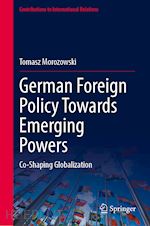
Questo prodotto usufruisce delle SPEDIZIONI GRATIS
selezionando l'opzione Corriere Veloce in fase di ordine.
Pagabile anche con Carta della cultura giovani e del merito, 18App Bonus Cultura e Carta del Docente
This book examines the complex process of German foreign policy adaptation to a shifting global landscape, especially to the rise of new powers. Addressing a scholarly audience, the book sheds light on the evolution of Germany's post-reunification international role beyond the Euro-Atlantic structure.
Grounded within the theoretical framework of neoclassical realism, the book analyzes the inner workings of Germany's global policy formation. It scrutinizes the state's relations with rising and emerging powers, including China, Brazil, India, South Africa, Mexico, Vietnam, Indonesia, Nigeria, Saudi Arabia, and the United Arab Emirates, exploring the details of Berlin's approach. The book presents the motives, goals, instruments, and future prospects of Germany's foreign policy regarding these states. It further explores the dynamics of Germany's civilian and economic power, while addressing the growing call for increased responsibility within the European Union as well as in global politics.
Readers will gain insight into the foundations, tools, and effectiveness of Germany's foreign policy, providing a quintessential case study of how a European state navigates the challenges of a rapidly changing global landscape. This makes the book a must-read for researchers specializing in German studies as well as for scholars of international relations and foreign policy.
Chapter 1. Introduction.- Chapter 2. In Need of an Update: How to Study Foreign Policy in the Context of Globalisation.- Chapter 3. Linking Systemic Changes to Domestic Factors: Neoclassical Realism as a Tool for Analysing a State’s Global Policy.- Chapter 4. From Analysts’ Minds to Formal Groupings: the Rise of Emerging Powers.- Chapter 5. Abandoning Continuity for Adaptation: the Landscape of Thought on the Evolution of Germany’s Foreign Policy.- Chapter 6. Global Networking in Practice: Government Strategies for Germany’s Engagement With Emerging Powers.- Chapter 7. The Fusion of Interests and Values: Dimensions of Cooperation Between Germany and Emerging Powers.- Chapter 8. The Challenge of Diversity: Case Studies of Germany’s Partnerships With Emerging Powers.- Chapter 9. Conclusions.
Tomasz Morozowski holds a PhD in political science from Adam Mickiewicz University in Poznan, Poland, and has been an Analyst at the Institute for Western Affairs in Poznan since 2015. He is the author of various Polish and international publications and his research focuses on international relations, foreign policy of Germany and the European Union, Europe-China relations, emerging powers, globalization, digitalization, and innovations in the European economy.











Il sito utilizza cookie ed altri strumenti di tracciamento che raccolgono informazioni dal dispositivo dell’utente. Oltre ai cookie tecnici ed analitici aggregati, strettamente necessari per il funzionamento di questo sito web, previo consenso dell’utente possono essere installati cookie di profilazione e marketing e cookie dei social media. Cliccando su “Accetto tutti i cookie” saranno attivate tutte le categorie di cookie. Per accettare solo deterninate categorie di cookie, cliccare invece su “Impostazioni cookie”. Chiudendo il banner o continuando a navigare saranno installati solo cookie tecnici. Per maggiori dettagli, consultare la Cookie Policy.